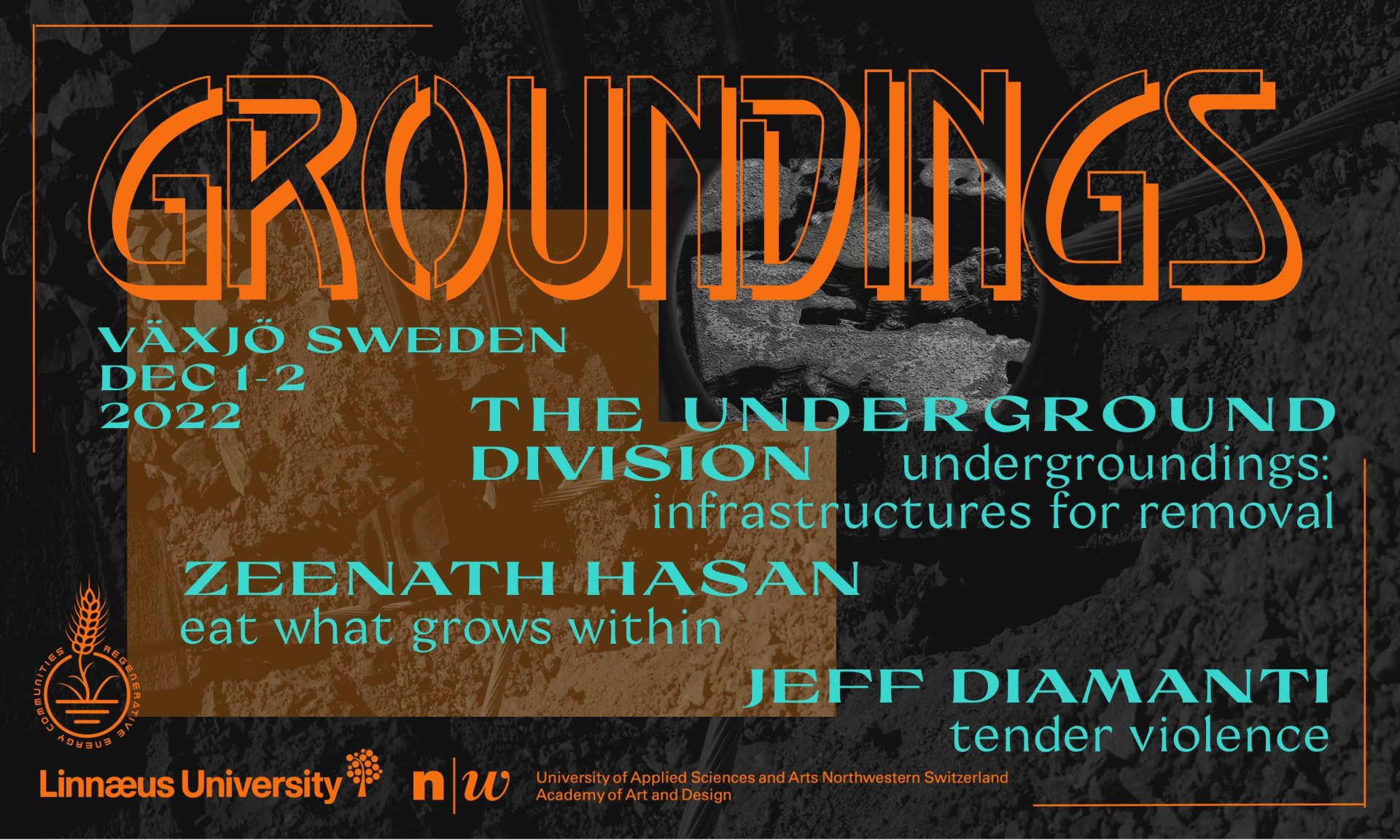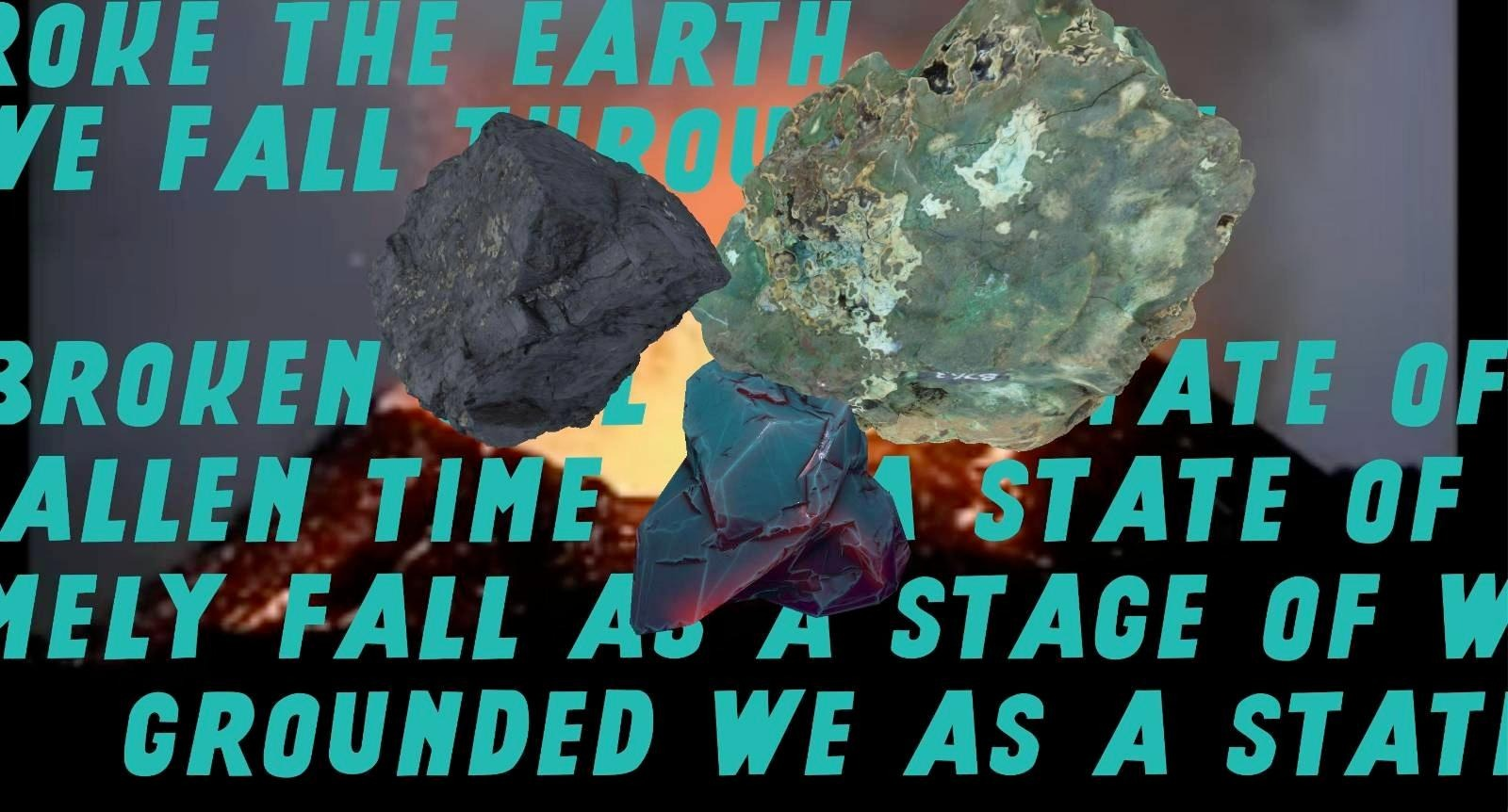
Groundings // December 1-2, 2022 // Linnaeus University, Växjö, Sweden
At the nexus of energy and agriculture, Groundings gathers a community of researchers, practitioners, and organisers in Växjö to ask what it means to ground our modes of study in collective struggle. The conference engages a diversity of research tactics in response to an ongoing shift in environmental discourse towards the extractive zones (Gómez- Barris 2017) and terminal landscapes (Diamanti 2021) of capital’s energic and agricultural metabolisms as terrains across which the histories and horizons of multispecies survival, collective autonomy, and ecological flourishing are contested. Featuring keynotes from Jeff Diamanti and The Underground Division (Helen V. Pritchard, Jara Rocha, & Femke Snelting) followed by a culinary performance by local grower Zeenath Hasan, Groundings also foregrounds roundtable discussions, group readings, and other modes of collaborative study to initiate an ongoing inquiry into grounded traditions of practice-based research. See the full conference call for papers further below.
For any question, you can contact the Groundings team at groundings@lnu.se
⚡🌱⚡🌱⚡🌱⚡🌱
THURSDAY DEC 1
09.00 Sign in & coffee
09.15 Introduction & welcome
09.30 Keynote: Jeff Diamanti, ‘Tender Violence’ (Södra-salen, M1083V)
11.00 Coffee
11.30 Breaking Ground: Energy, Extraction, Counterpractice (M1088)
Rose-Anne Gush & Philipp Sattler, ‘The Measure of Land, Or, How on Earth does one get to own a mountain?’
Fred Carter, ‘Terrains of Struggle: Grounding the Open Field’
Regenerative Energy Communities, ‘Grounding Collective Energy Imaginaries in the Soil’
13.00 Lunch
14.00 Political Agroecology: Subsistence Struggles & Culinary Interventions (M1088)
Studio HOTmess (Charlotte Moore & Maria Saeki), ‘Edible Hinterlands’
Gabriela Aquije Zegarra, ‘Culinary Return: Crafting Slow Disturbances from Chacra (farm) to Kitchen’
Åsa Sonjasdotter, ‘Re-reading Peace With the Earth’
Chitra Sangtani, ‘Caste, Contamination & Contested Ecologies: The Case of Yamuna Khadar in Delhi’
15.45 Coffee & fika
16.00 Screening: Åsa Sonjasdotter, Cultivating Abundance (2022) (Södra-salen, M1083V) film screening & Q&A
17.30 Break
18.30 Keynote: Zeenath Hasan, Eat What Grows Within (M-Hus Main Hall) performance meal
FRIDAY DEC 2
09.30 From the Áltá Action to Present Struggles (Södra-salen, M1083V)
Elina Waage Mikalsen & Magnus Holmen, Geaidnoearus / Ved Veiskillet (2022) film screening & introduction
Søstrene Suse, Baajh vaeride årrodh! Let the mountains live! (2021) listening session followed by Q&A with Ingrid Fadnes
10.30 Coffee
10.45 Colonial Infrastructure & Sámi Resistance (M1088)
Láhja Ida Soininen, ‘Čájet Sámi Vuoiŋŋa! Colonial History in Sápmi & Language as a Cultural Carrier’
Kolonierna, ‘Green Colonialism & Resistance in Sápmi’
12.00 Lunch
13.00 Fielding Practice: Sites, Grounds, Terrains (M1088)
Laboratory for Aesthetics & Ecology (Ida Bencke & Dea Antonsen), ‘Hosting Lands: Between the Ruin, the Forest & the Field’
Roberta Burchardt, ‘Polyphonic Reading: The Luso-Brazilian Sobrado House’
Cassandra Troyan & Helen V. Pritchard, ‘The Anti-Menagerie: Trans-species Solidarity & Resistance in the Field’
14.30 Coffee & fika
14.45 Submerged Grounds, Reclaimed Lands (M1088)
William Jamieson, ‘The Island at the End of the World: The Plot Holes of Land Reclamation & the Sediments of the Anthropocene’
Sean O’Brien, ‘On the Possibilities of Post-Growth Living: Racialized Foreclosure in Post-Katrina Climate Fictions’
Winnie Soon & Lee Tzu Tung, ‘Forkonomy(): How to buy/own/mint one millilitre of the ocean from the South China Sea?’
16.15 Break
16.30 Keynote: The Underground Division (Jara Rocha, Helen V. Pritchard, Femke Snelting), ‘Undergroundings: Infrastructures for Removal’ (Södra-salen, M1083V)
18.00 Break
19.30 Buffet dinner at MäM, Italianske Palatset
20.30 Plant-based afterparty!
End of conference hangout, drinks, and collective making with Regenerative Energy Communities: experimenting with micro-energy prototypes and low-powered circuits at the underground plant-rave.
⚡🌱⚡🌱⚡🌱⚡🌱

Call for Papers: Groundings
At the nexus of energy and agriculture, Groundings gathers a community of researchers, practitioners, and organisers in Växjö to ask what it means to ground our modes of study in collective struggle. The conference engages a diversity of research tactics in response to an ongoing shift in environmental discourse towards the extractive zones (Gómez- Barris 2017) and terminal landscapes (Diamanti 2021) of capital’s energic and agricultural metabolisms as terrains across which the histories and horizons of multispecies survival, collective autonomy, and ecological flourishing are contested. Featuring keynotes from Jeff Diamanti and The Underground Division (Helen V. Pritchard, Jara Rocha, & Femke Snelting) followed by a culinary performance by local grower Zeenath Hasan, Groundings also foregrounds roundtable discussions, group readings, and other modes of collaborative study to initiate an ongoing inquiry into grounded traditions of practice-based research.
From the decolonial practices of Walter Rodney’s Groundings With My Brothers (1966) to the working-class environmentalism of Sven Lindqvist’s Dig Where You Stand (1978), this two-day conference aims to build a collective vocabulary and critical infrastructure around methodologies that remain accountable to the interlocking demands of decolonisation, decarbonisation, and liberation. Situated within ongoing struggles over energy and agriculture, this initial gathering asks how ‘grounded environmental and territorial questions’ might manifest as an ‘on-the-ground set of contingent politics’ (Gergan & Curley, 2021) within these fields. Whether speaking of renewable practices or large-scale farming, these terrains continue to be framed by the manifold emergent and long-standing settler colonial technologies that organize them, hardening relations to land based on domination in transnational arenas (Yang 2017) and modes of financial exploitation or extractive speculation (Dunlap 2021). Nonetheless, the current ‘crisis’ of energy and agriculture marks an opening for radical interventions.
Addressing both ‘terrains of domination’ and ‘terrains of struggle,’ we invite contributions across multiple formats to delineate the material, methodological, and ‘epistemological grounds through which we theorize and imagine and name liberation’ (McKittrick 2006; 2021). Disturbing the sediments of empire, filmmaker Filipa César’s ‘“mining”’ of historical strata’ (2018) in Amílcar Cabral’s agronomical texts provincialises Marxist accounts of soil metabolism while contemporary framings of ‘racist environments’ (Opperman 2019; Sharpe 2017), decolonial botany (Sheikh & Gray 2018), or late neoliberalism’s ‘polluted politics’ (Onís 2021) take up lineages of anticolonial struggle to envision transformative ecologies. We might also look to feminist agroecological practices shared through generational knowledge and anticapitalist relations to land (Tamm & Wägner 1940; Sonjasdotter 2019) or to the ‘grounded’ place-based solidarities (Coulthard & Simpson 2016) that shape Indigenous resistance to fossil capital and colonial agronomy. Within the ancestral territory of Sápmi, which stretches across the settler states of Sweden, Norway, Finland, and Russia, Indigenous Sámi land is exploited through the corporate extractivism and green colonialism of wind and water energy projects. Refusing these modes of capture, Indigenous land stewardship movements such as the Áltá Action or Ellos Deatnu! counter the horizons of capitalist ‘green transition’ through direct actions that frame artistic practices as an intrinsic part of the struggle for self-determination (García-Antón, Gaski & Guttorm 2020; Kuhn 2020).
In taking up the provocation of militant research practices as an attempt to ‘generate capacity for struggles to read themselves’ (Colectivo Situaciones 2005), Groundings seeks to cement alliances between an expansive set of disciplinary coordinates including anticolonial methods, environmental humanities, artistic research, postcapitalist and decolonial design, critical geography, infrastructure studies, historical materialism, activism, solidarity studies, soil studies, queer trans*feminist technoscience, militant cinema, and beyond.
We invite contributions in a range of formats, including panel papers, performance lectures, or shorter creative/critical roundtable provocations. Please submit a short bio and brief description (300 words max) of your research or practice, as well as your intended intervention in relation to the core conference themes. These include, but are not limited to, the following:
- Land-defence, place-based solidarity, and ‘grounded normativity’ (Coulthard 2014)
- Investigations of soil degradation, extractive land-use, or water pollution, through citizen sensing (Gabrys 2017), militant measurement, or ‘dirty work’ (Yang 2017)
- Socially-embedded research and milieu-specific methods
- Energy infrastructure, counterlogistics, and sabotage (Barney 2019)
- Anticolonial agroecological practices and decolonial botany (Sheikh & Gray 2018)
- Workers’ inquiry and environmentalism ‘from below’
- Green colonialism and resistance to ‘infrastructures of empire’ (Aouragh & Chakravartty 2016)
- Energy metabolism, agronomy, and metabolic rift
- Abolition geographies (Gilmore 2022) as sites for the material or grounded demands of liberation and freedom
- ‘Racist environments’ (Opperman 2019), Black feminist ecologies (Frazier 2020), and the agricultural interstices of the Black commons (Roane 2018)
- Multispecies ecological justice, solidarity, and world-building (Gumbs 2020; Simpson 2021)
- Mutual aid, autonomous infrastructures, and community self-defense
- Site-specific artistic research and design practices in relation to place-based histories of environmental resistance
- Agroecological and other grassroots movements and initiatives tied to farming and food production through non-invasive methods and collective resistance to monocultural oppression
- Indigenous methodologies and regenerative knowledge for land-based practices of refusal
- Eco-nationalism and anti-fascism (Zetkin Collective 2021)
Please send submissions and questions to groundings@lnu.se by October 10th
You will be informed if your proposal is accepted on October 17th
There is no conference fee. Lunches and refreshments will be provided to participants for both days of the conference. The performance dinner is also included for participants. The keynotes are open for non-conference participants to attend.
Groundings is supported by funding from Linnaeus University, Regenerative Energy Communities, and the Institute for Experimental Design and Media Culture (IXDM), FHNW University of Applied Sciences and Arts Northwestern, Switzerland.
Organised by:
Cassandra Troyan, Department of Design, Linnaeus University
Fred Carter, Saltire Emerging Researcher, University of Edinburgh & University of Amsterdam
Eric Snodgrass (on behalf of Regenerative Energy Communities), Linköping University & Linnaeus University
